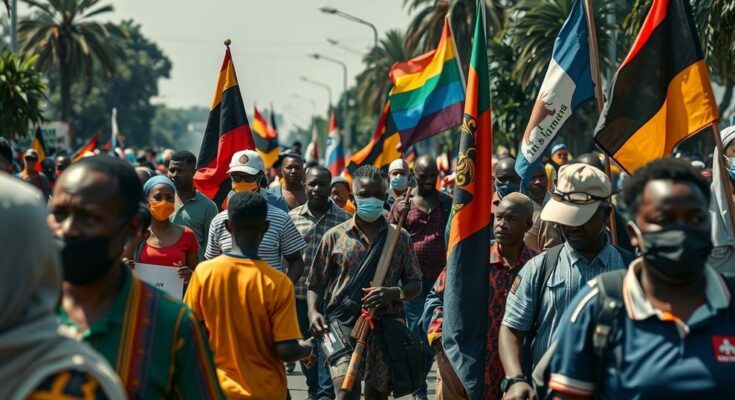Protests across West Africa are often met with violent suppression from security forces, leading to numerous deaths and injuries among demonstrators. Amnesty International emphasizes that such violence reflects state weakness rather than strength, highlighting systemic issues of repression and diminishing civil liberties. Regional authorities must address these violations to restore accountability and protect human rights.
In West Africa, the landscape of protests is marred by violence from state security forces, often leading to tragic consequences for demonstrators. Countries such as Senegal, Guinea, and Mali have witnessed significant casualties – with numerous young individuals killed or injured due to the excessive force used by law enforcement during demonstrations. Amnesty International underscores that such brutality is not a testament to governmental strength, but rather indicative of state fragility, undermining the legitimacy of these regimes.
The recent annual human rights reports detail alarming incidents, wherein at least 65 lives were lost in Senegal amid anti-government protests, while Guinea reported 113 fatalities among young demonstrators since 2019. In Sierra Leone, a surge in protests against the cost of living culminated in the death of 27 individuals, alongside the loss of six police officers. Meanwhile, Mali’s history of protest violence claimed 18 lives during protests reflecting discontent with poor governance. Other nations like Nigeria and Côte d’Ivoire are also grappling with similar tragedies.
This violence is deeply entrenched in a broader context of diminishing civil liberties and aggressive repression of dissent, with governments clamping down on political expression and freedom of assembly. Political activities have been curtailed in nations like Mali and Burkina Faso, and in Guinea, authorities have banned public demonstrations altogether. Such restrictions have fostered a climate where law enforcement feels emboldened to act violently, often with impunity.
Regrettably, the promises of investigations into these violent acts frequently yield little to no accountability. For instance, despite claims of thorough inquiries into police violence in Guinea, very few cases have led to trials. Legislative measures, such as Senegal’s 2024 amnesty law, have extinguished potential legal recourse for victims’ families, perpetuating a cycle of violence shielded from scrutiny.
The justification offered by authorities for the violence often fails to comply with international human rights standards, as they cite illegal or violent demonstrations as grounds for excessive force. However, principles governing the use of force stipulate non-violent methods must be exhausted prior to deploying coercive measures, with strict adherence to legality and proportionality.
The ramifications of such brutality extend far beyond immediate casualties, leaving many victims physically and emotionally scarred. Amnesty International’s report highlights that the most affected individuals are often from disadvantaged backgrounds, further exacerbating their plight due to inaccessibility of adequate medical care. This systematic abuse has engendered a culture of mistrust towards state institutions, reflecting a fundamental failure in governance and the maintenance of order.
Ultimately, the unchecked violence faced by protesters in West Africa signals not strength but an alarming weakness of state structures. A government that resorts to violence against its citizens demonstrates a profound failure to uphold the principles of law, order, and human rights. It is imperative for regional authorities to address this crisis and foster an environment conducive to human rights engagement and political expression to restore credibility and trust among their populations and in the international community.
The ongoing protests in West Africa reveal a worrying trend of violence perpetrated by state security forces against demonstrators. Recent reports highlight numerous fatalities and injuries stemming from excessive force during civil protests, which reflect discontent with various socio-political issues including governance and economic hardship. Amnesty International’s findings illuminate the alarming frequency with which law enforcement officials resort to lethal means against civilians, portraying a grim picture of state-sanctioned repression in response to dissent, thus sparking widespread condemnation and calls for reform.
In conclusion, the violent crackdown on protests in West Africa starkly illustrates a failure of governance and the erosion of civil liberties. The reported casualties reflect deep-seated systemic issues within state apparatuses that prioritize suppression over dialogue. For the integrity and credibility of these regimes to be restored, there must be an urgent reevaluation of law enforcement protocols regarding the use of force, a commitment to accountability, and a genuine engagement with the rights of citizens. Unless these issues are addressed, public trust will continue to deteriorate, and the cycle of violence will persist.
Original Source: www.amnesty.org




